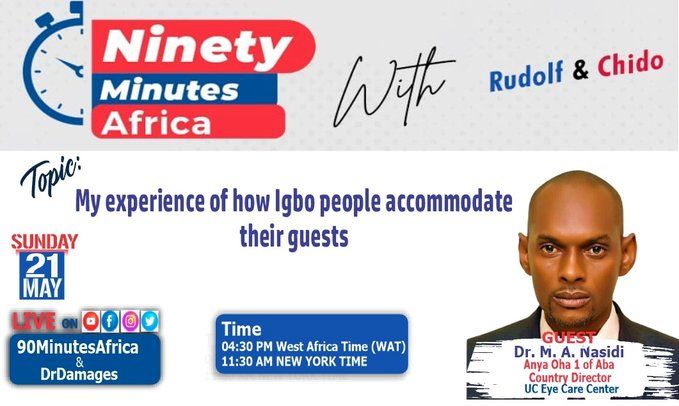Our Reporter, New York
The Country Director of Remedi Foundation, Netherlands, Dr. Muhammad Nasidi, has narrated his experience in the National Youth Service Corps (NYSC) scheme which took him to the South-East of Nigeria as a young doctor from the predominantly Muslim North and how he was conferred with the title of Anya Oha 1 of Aba in recognition of the selfless assistance he rendered to people of the region. He spoke during a special episode of 90Minutes Africa hosted by Rudolf Okonkwo to mark the 50th anniversary of the NYSC scheme.
Dr. Nasidi explained that he was initially anxious about his posting to the South-East because of the predominant belief in the North that it is often very difficult to integrate into the society because of the differences in religious and cultural practices.
“For Northerners who have never been to the South, they are always anxious about the challenges they would face. That fear made me feel like it was going to be very difficult to survive in that environment. But on arrival at Orlu, in Imo State, I was surprised to find a thriving Igbo Muslim community there, and that put me a little bit at ease,” he narrated.
Dr. Nasidi also recalled that: “On arrival at Orlu, I found out that the people are accommodating and friendly. I also found out that the Igbo people love visitors who add value to their society.”
Speaking further, he said that if one is a professional, the Igbos will “treat you in high esteem and support you with everything you require to achieve your objectives” and that support motivated him to go around the communities to see how he can be of help.
“I visited a lot of rural communities researching about cases of onchocerciasis (River blindness) which was a problem in the North at that time,” the Ophthalmologist said.
Explaining the circumstances that led to his 16 years post-NYSC stay in the South-East, the member of the Emirate Council in Adamawa said he chose to return to the South-East with Remedi Foundation after his one-year mandatory service to help the people in the region through medical outreach.
“When I returned, I chose to stay in Aba because from there, I can get to Owerri easily, I can get to Umuahia easily, and I can get to Anambra easily. So I see Aba as a central place where I can get to many communities around me.
“We did research on the onchocerciasis programme. My duty was to identify communities that were having epidemics of the flies that cause river blindness and report to my organisation who will then liaise with the Ministry of Health to handle the situation in the community,” he explained.
On how he was conferred with the traditional title of Anya Oha 1 of Aba, the Adamawa-born doctor said it happened when he worked as an eye consultant for the Aba South Local Government Area. He said the Traditional Council of Aba wanted to confer a title on the chairman of Aba South LGA, and they also insisted that he would be honored in recognition of his hard work and assistance to the people of the area.
Dr. Muhammad Nasidi described the people of South-East as very accommodating and will do everything they can to protect their guests. He recalled how members of the Hausa community in Aba were protected by their hosts during the riots in 2000, a retaliation for the religious crisis in Kaduna.
“The main Hausa community in the city was kept safe by the Igbos,” he said.
“As secretary of the Hausa community then, I recorded about 7200 survivors, and most of them testified that it was the Igbos who protected them. So I asked, if these people want us dead, why did they take us to the police station for safety?
“I saw a lot of Hausa people that worked for Igbos that were brought to the police station for protection,” Dr. Nasidi, who is writing a book on his experiences, said. “These gestures made me believe that these crises were not out of general hatred or else those 7200 people wouldn’t have survived. We would have been killed by the people who saved us. The Igbos are very hospitable and accommodating to their guests and will do everything to protect you,” Dr. Nasidi concluded.

